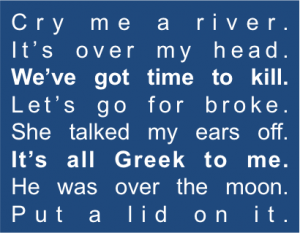What is an idiom? An idiom is an expression, sometimes colorful, that conveys an idea that is different from its literal word-for-word meaning. Idioms are insider phrases that native speakers use and understand, often without even realizing that the phrases are idioms. Because idioms come so naturally to native speakers, non-native speakers are sometimes inadvertently “left in the dark” (an idiom meaning “excluded from understanding”) when an idiom is used. The non-native speakers may then ask themselves, “We know what was said, but what did it actually mean?” To illustrate the confusion that idioms can cause, consider the following paragraph full of idioms (in italics) that might be difficult for a non-native speaker to understand:
An idiom is an expression, sometimes colorful, that conveys an idea that is different from its literal word-for-word meaning. Idioms are insider phrases that native speakers use and understand, often without even realizing that the phrases are idioms. Because idioms come so naturally to native speakers, non-native speakers are sometimes inadvertently “left in the dark” (an idiom meaning “excluded from understanding”) when an idiom is used. The non-native speakers may then ask themselves, “We know what was said, but what did it actually mean?” To illustrate the confusion that idioms can cause, consider the following paragraph full of idioms (in italics) that might be difficult for a non-native speaker to understand:
I was asked yesterday to write off the top of my head a paragraph about metaphors. I felt out of my depth and wasn’t sure that I was up to the task. I decided to sleep on it before trying my hand at the project. It would have been a piece of cake if I could have bounced ideas off of someone else, but it was ultimately up to me to fly by the seat of my pants and give the project my best shot.
Idioms can have their origins in past cultural experiences or they may exist as snippets of literary works. Connections to these origins are often long forgotten, but expressions continue to be repeated as time passes, ultimately surviving as idioms in our current everyday speech. Every language has its idioms, and it is interesting to compare how the same idea might be idiomatically expressed in different languages. For example, the English idiom to express utter confusion about something is, “it’s Greek to me,” whereas the eastern European idiom for the same idea is, “it is a Spanish village to me.”
Unfortunately, the only way to learn idioms in any language is to memorize them one by one, preferably after encountering each in the teachable moment when they are first heard. Knowing how to use a language’s idioms, in a nutshell ("in summary"), is an important English skill. Just make sure that when you choose which idioms to learn, you "separate the wheat from the chaff" (an idiom meaning, “separate the good ones from the bad ones.”)
To learn more idioms, click on our "List of English idioms".

 About MyOvient
About MyOvient Contact Us
Contact Us


